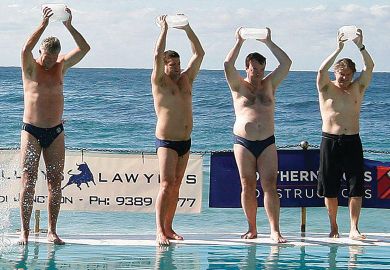Teaching through immersive modules – also known as ‘block teaching’ – boosts undergraduate grades, research from one UK university has found.
Academics at the University of Plymouth found that introducing immersive teaching, in which students are taught one subject at a time, rather than having students take multiple subjects simultaneously, improved students’ marks by about 4 percentage points.
Since 2015, undergraduates at Plymouth have spent the first four weeks of their first and second terms studying one module intensively, and then spend the remainder of the term studying courses alongside each other over 11 weeks.
In the study, published in the Journal of Further and Higher Education, researchers analysed the assessment results of first-year students from 14 out of its 16 departments, which included 500 immersive and traditional modules. Medicine and dentistry did not implement the immersive method so were not included.
Looking at the scores of more than 2,000 first-year students in the 2015-16 academic year, the researchers found that the mean mark for the immersive module in first semester was 67 per cent and the mean mark for the traditionally taught modules was 63.5 per cent.
In the second semester, the mean mark for the immersive module was 64.7 per cent, compared with 61.7 per cent for the traditionally taught modules.
The researchers also found that while both genders’ marks benefited from immersive teaching, the impact on male students’ marks was more pronounced.
The study also found that students across all entry tariffs had better grades for the immersive modules. However, those in the lowest entry group found the biggest benefit from immersive teaching: in the second semester their immersive grades were 62.8 per cent, compared with 58 per cent on the traditional module. For the students who entered the university on the highest tariffs, their improvement was much more modest, from 64.8 per cent on the traditional course to 66.4 per cent on the immersive one during the first semester.
The authors conclude that while there were other possible factors that could affect student grades, such as the marking style of the teachers, the overall value of immersive teaching was clear, particularly because of the study’s scope across the whole institution and multiple disciplines.
Studies from Australia, where adopters of block teaching include Victoria University, have reported similarly positive effects on student attainment.
Oliver Webb, one of the authors of the Plymouth study and an educational developer at the university, said the institution had hoped that immersive teaching would help with the transition to higher education and help students get “used to the higher demands and expectations, such as around referencing, while also helping social integration”.
“Finding that [immersive teaching] provided a supportive environment for student performance was good news” and shows that this form of teaching could help tackle some of the attainment gaps in higher education, he said.
According to Dr Webb, there is more research to be done but “hopefully it gives other institutions confidence and reassurance that immersive teaching can be done and has positive outcomes”.
Register to continue
Why register?
- Registration is free and only takes a moment
- Once registered, you can read 3 articles a month
- Sign up for our newsletter
Subscribe
Or subscribe for unlimited access to:
- Unlimited access to news, views, insights & reviews
- Digital editions
- Digital access to THE’s university and college rankings analysis
Already registered or a current subscriber?




